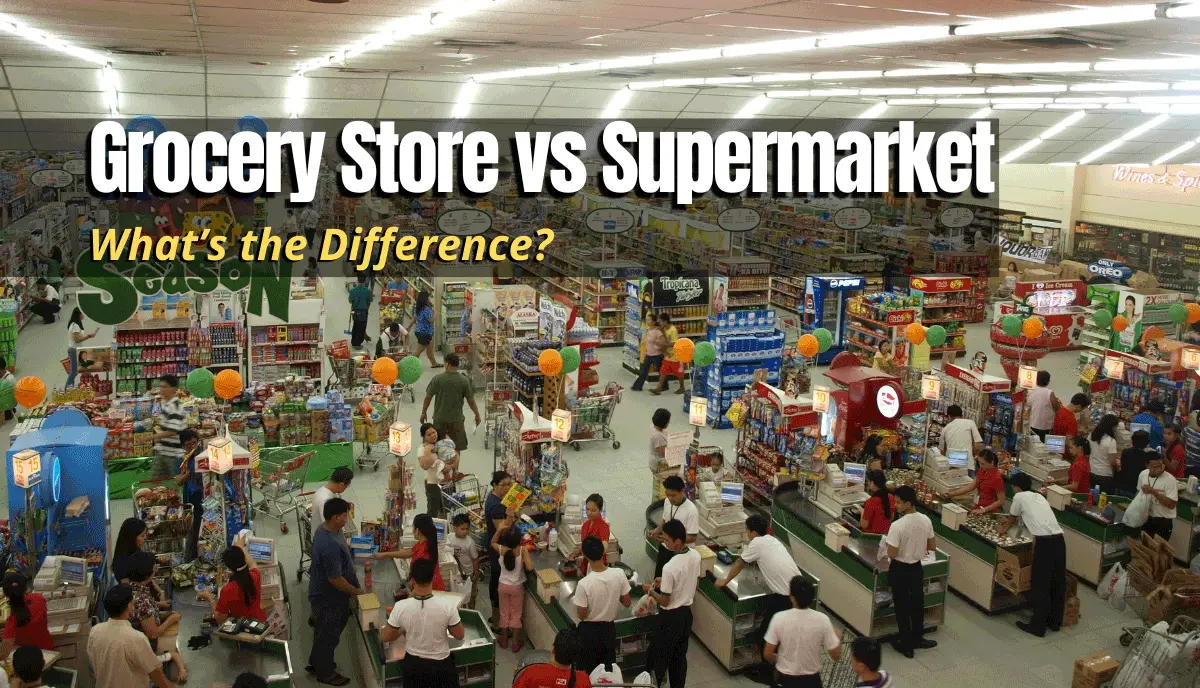The term ‘grocery store’ is often used interchangeably with ‘supermarket,’ but these are two very different stores. These types of shops used to be easily differentiated between, but more grocery stores have been transitioning into the supermarket category in the last couple of decades, which has blurred the lines between grocery stores and supermarkets.
Grocery stores devote most of their shelf space to food and beverage products. They typically have small sections of other items, like paper goods and pet supplies, but their primary inventory consists of groceries. Supermarkets tend to be larger than grocery stores and offer a wider variety of products, such as small kitchen appliances and dishware.
There are several differences between grocery stores and supermarkets, but it mostly boils down to their inventories. If you’re wondering which shop you need to visit, then you’re in the right place! We’ll explore the various differences between these shops in this detailed guide, so let’s get started.
What Is a Grocery Store?
The very first grocery store was founded in 1916 in Memphis, Tennessee. It was named Piggly Wiggly, which is still a very popular grocery store to this day. Grocery stores were created to be a place where customers could buy all their food, beverages, and baking needs in one place rather than having to visit multiple farmer’s markets.
Today, grocery stores are all over the US. These self-service stores provide customers with everything they need to make full meals, including various food, beverages, spices, and baking necessities.
The floor plan of grocery stores is devoted to selling categorized food and beverages, however, they often have a couple of other sections as well for the sale of over-the-counter medications, paper products, pet supplies, etc.
Most grocery stores have a heavy emphasis on their produce, meat, and dairy sections. These stores often have a larger selection of fresh products than other stores and often have special sections for cakes or other baked goods.

What Is a Supermarket?
Supermarkets became accepted in the US during the 1930s. It’s thought that the first supermarket was opened by a former Kroger employee and named King Kullen. This store offered a variety of groceries and non-food items.
A supermarket is often marketed as a one-stop place to shop for customers. They usually have all the same food and household products as a grocery store. However, these stores devote an equal amount of shelf space to groceries and household products.
Most supermarkets have the same categorized layout as grocery stores. They sell a combination of pre-packed food and beverages, as well as plenty of fresh food. Supermarkets have large dairy, produce, and meat sections, along with other sections for cakes, baked goods, deli products, and often have a hot food or salad bar area.
You can find plenty of household appliances and products at supermarkets. These stores often have several other sections as well for things like electronics, gardening equipment, clothing, and more.
What’s the Difference Between Grocery Stores and Supermarkets?
It’s easy to confuse the terms grocery store and supermarket because of their many similarities. The growing trend of grocery stores adding more products and altering their floor plans to compete with the popularity of supermarkets has caused further confusion and adds to the confusion of what separates a grocery store and a supermarket.
However, there are clear differences between these stores involving their inventories, general size, prices, and hours of operation. So, let’s dive in and discuss the major differences between grocery stores and supermarkets.
If you are interested we also compare a Supermarket vs a Convivence Store in this article here.
Purpose of a Grocery Store vs Supermarket
The primary purpose of a grocery store is different from that of a supermarket. Grocery stores are designed to provide their customers with everything they need to make full, healthy meals and provide them with some related items.
Grocery stores also sell snacks, paper goods like paper towels, napkins, utensils, etc., and pet food. These stores often have a few other categories of products as well, but the majority of their focus is on food and food-adjacent products.
A supermarket is meant to be a one-stop shopping experience for customers. These stores sell a wide variety of food and beverages, plenty of food-adjacent products, small kitchen appliances, and other items customers might need, like electronics and clothing.
When you visit a grocery store, you can expect to get all the food you need and few household items. Visiting a supermarket gives you the opportunity to buy a wide variety of things you may need for your home and your life.
Products of a Grocery Store vs Supermarket
We discussed how the primary difference between these two stores is their inventories, so let’s look at this in greater detail. We’ll list the general categories of products most grocery stores, and supermarkets sell so you can see how much more variety a supermarket provides its customers.
Grocery Store Products:

- Pre-packaged food & beverages
- Baking products & spices
- Produce
- Meat
- Deli
- Dairy
- Bakery
- Paper goods
- Household cleaners
- Small housewares
- Pet supplies
- Over-the-counter medications (and occasionally pharmacies)
- Alcohol (in some states)
- Tobacco products (only in some stores)
- Personal care products
- Books/magazines/newspapers
Based on these categories, it’s easy to see that grocery stores focus mainly on food and related categories. Now, let’s look at how that differs from what a supermarket offers.
Supermarket:
- Pre-packaged food & beverages
- Baking products & spices
- Produce
- Meat
- Deli
- Dairy
- Bakery
- Paper goods
- Household cleaners
- Small kitchen appliances
- Housewares
- Pet supplies
- Pharmacies and over-the-counter medications
- Alcohol (in some states)
- Tobacco products (only in some stores)
- Personal care products
- Books/magazines/newspapers
- Electronics
- Flowers
- Beauty products
- Clothing
- And more!
Not all supermarkets will look the same. Some may offer more categories than those listed above, while others may offer less. However, you can always expect supermarkets to offer a solid variety of food items and a large selection of non-food items.
Hours of Operation for Grocery Stores vs Supermarkets

Grocery stores and supermarkets generally have the same hours of operation. You can expect most grocery stores and supermarkets to be open between 6-8 am and 8-10 pm. However, if you’re looking for a shop with extended hours, you’re more likely to find a supermarket open later.
Some supermarkets are open 24 hours, but it’s very rare to find grocery stores open overnight. This is a fairly minor difference between these two stores, but if you find yourself in a store that’s open 24 hours and aren’t sure whether it’s technically a grocery store or a supermarket, then it’s most likely a supermarket.
Comparison Questions (Grocery Store vs Supermarket):
Are Grocery Stores Bigger Than Supermarkets?
While there are plenty of spacious grocery stores in the US, such as Piggly Wiggly, Food Lion, and Publix, the average grocery store is going to be smaller than a supermarket.
Supermarkets sell more items than grocery stores, so they need more floor space to support their inventory. Additionally, since supermarkets have more categories of products available, they often have a larger floor plan in order to create a comfortable walking path through the store.
Are Grocery Stores More Expensive Than Supermarkets?
You may have noticed that the prices at your local grocery store are a bit higher than at the nearest supermarket. Most grocery stores are more expensive than supermarkets, but there’s a real reason for the price differences.
Supermarkets are usually bigger stores and therefore need to order more of the same products. Most supermarkets buy in larger bulk quantities than grocery stores, so they get a discount from distributors. This allows them to sell their products at a lower price.
Since grocery stores are smaller, they’re buying fewer quantities of products. They need to set their prices higher in order to make a profit.
Do All Grocery Stores and Supermarkets Have Self-Checkout?
A Kroger in Atlanta, GA, installed the very first self-checkout in 1986. This was considered revolutionary at the time, and this technology became very popular throughout the early 2000s. These days, you’d be hard-pressed to find a store that doesn’t have a self-checkout option.
All major grocery stores and supermarket chains have installed self-checkout areas. However, that doesn’t mean every grocery store and supermarket in the country uses self-checkout.
Small, family-owned grocery stores may not have this technology installed yet, and supermarkets in very rural areas with low populations may not have the funds to employ this technology yet.
However, if you’re shopping at a major grocery store or supermarket chain, then it’s very likely you’ll see a self-checkout area.
Related Questions:
Is Walmart a Grocery Store or a Supermarket?

Walmart is a very popular retailer in the US. They have over 4,000 stores in almost every state in the US. Many people wonder whether this retailer is considered a grocery store or a supermarket, and this answer is actually a little complicated.
Walmart isn’t a grocery store or a supermarket. This retailer is considered a hypermarket, which is a big box store comprised of a supermarket and a department store.
So, it’s fair to consider Walmart supercenters as a type of supermarket. However, Walmart also has stores that specifically sell groceries and related items. The Walmart Neighborhood Market stores would be considered grocery stores.
What Are the Most Popular Grocery Stores?
There are several major grocery store chains throughout the US. Some have locations in nearly every state, while others are only popular regionally. If you’re looking for the most popular grocery stores in the US, then check out this list:
- Walmart Neighborhood Market
- Albertsons
- Publix
- Kroger
- Fred Meyer
- Piggly Wiggly
- Food Lion
- Whole Foods
- Safeway
- Aldis
What Are the Most Popular Supermarkets?
Plenty of big-name supermarkets exist throughout the US, although you might be surprised by what’s on this list. Several stores that many people assume are supermarkets, such as BJs or Sam’s Club, are actually categorized as membership warehouse clubs.
Here’s a list of the most popular supermarkets in the US:
- Hy-vee
- Big Y
- Stop and Shop
- Shoprite
- Meijer
- Price Chopper
All of these stores offer a wide selection of groceries and household items. You can find a better variety of products at these stores than at grocery stores.
The Verdict– What’s the Difference?
Grocery stores and supermarkets have many similarities, but their differences are pretty obvious. Supermarkets offer more variety in their food and beverage selections than grocery stores. Grocery stores focus mainly on selling food and related items, while supermarkets often have departments for electronics, clothing, and more! Also, since supermarkets typically have more products, and can purchase their inventory in bulk, their prices are lower than grocery stores.

